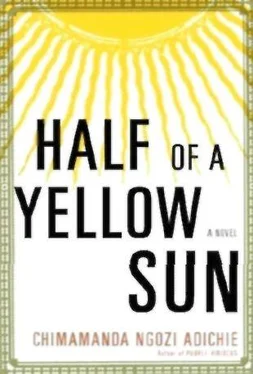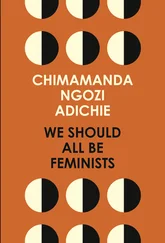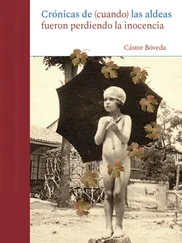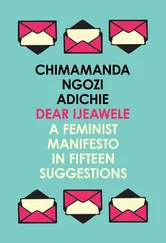"You should lie down, nkem," Odenigbo said.
"Do you remember the words of Okeoma's poem about making the sun rise if it refused to rise?" she asked.
'"Clay pots fired in zeal, they will cool our feet as we climb,'" he said.
"Yes, yes."
"It was my favorite line. I can't remember the rest."
A woman from the refugee camp dashed into the yard, shouting, waving a green branch. Such a brilliant wet-looking green. Olanna wondered where she got it; the plants and trees around were scorched, blown bare by the dusty winds. The earth was sallow.
"It is over!" the woman shouted. "It is over!"
Odenigbo quickly turned the radio on, as though he had been expecting the woman with this news. The male voice was unfamiliar.
Throughout history, injured people have had to resort to arms in their self-defense where peaceful negotiations fail. We are no exception. We took up arms because of the sense of insecurity generated in our people by the massacres. We havefought in defense of that cause.
Olanna sat down; she liked the honesty, the firm vowels, and the quiet assuredness of the voice on the radio. Baby was asking Odenigbo why the woman from the camp was shouting like that. Richard got up and came closer to the radio. Odenigbo increased the volume. The woman from the refugee camp said, "They said the vandals are coming with canes to flog the hell out of civilians. We are going into the bush," and then turned and ran back to the camp.
Itake this opportunity to congratulate officers and men of our armed forces for their gallantry and bravery, which have earned for them the admiration of the whole world. I thank the civil population for their steadfastness and courage in the face of overwhelming odds and starvation. I am convinced that the suffering of our people must be brought to an immediate end. I have, therefore, instructed an orderly disengagement of troops. I urge General Gowon, in the name of humanity, to order his troops to pause while an armistice is negotiated.
After the broadcast, Olanna felt dizzy with disbelief. She sat down. "What now, mah?" Ugwu asked, expressionless. She looked away, at the cashew trees covered in dust, at the sky that curved to the earth in a cloudless wall ahead. "Now I can go and find my sister," she said quietly
A week passed. A Red Cross van arrived at the refugee camp and two women handed out cups of milk. Many families left the camp, to search for relatives or to hide in the bush from the Nigerian soldiers who were coming with whips. But the first time Olanna saw Nigerian soldiers, on the main road, they did not hold whips. They walked up and down and spoke loud Yoruba to one another and laughed and gestured to the village girls. "Come marry me now, I go give you rice and beans."
Olanna joined the crowd that watched them. Their pressed smart-fitting uniforms, their polished black boots, their confident eyes filled her with that hollowness that came with having been robbed. They had blocked the road and turned cars back. No movement yet. No movement. Odenigbo wanted to go to Abba, to see where his mother lay, and each day he walked to the main road to find out whether the Nigerian soldiers were letting cars pass.
"We should pack," he told Olanna. "The roads will open in a day or two. We will leave early so we can stop in Abba and then get to Nsukka before dark."
Olanna did not want to pack-there was little to pack anyway- and did not want to go anywhere. 'What if Kainene comes back?" she asked.
"Nkem, Kainene will find us easily."
She watched him leave. It was easy enough for him to say that Kainene would find them. How did he know? How did he know she had not been wounded, for example, and unable to travel long distances? She would stagger back, thinking they would be here to care for her, and find an empty house.
A man walked into the compound. Olanna stared at him for a while before she recognized her cousin Odinchezo, and then she shouted and ran to him and hugged him and moved back to look at him. She had last seen him at her wedding, him and his brother, in their militia uniforms.
"What of Ekene?" she asked fearfully. "Ekene kwanu?"
"He is in Umunnachi. I came immediately I heard where you were. I am on my way to Okija. They say that some of our mother's people are there."
Olanna led the way inside and brought him a cup of water. "How have you been, my brother?"
"We did not die," he said.
Olanna sat down beside him and took his hand; there were bloated white calluses on his palms. "How did you manage on the road with the Nigerian soldiers?"
"They did not give me trouble. I spoke Hausa to them. One of them brought out a picture of Ojukwu and asked me to piss on it and I did." Odinchezo smiled, a tired, gentle smile and looked so much like Aunty Ifeka that tears filled Olanna's eyes.
"No, no, Olanna," he said and held her. "Kainene will come back. One woman from Umudioka went on afia attack and the vandals occupied that sector so she was cut off for four months. She came back to her family yesterday."
Olanna shook her head but she did not tell him that it was not Kainene, not just Kainene, that she was crying about. She wiped her eyes. He held her for a moment longer and, before he got up, he pressed a five-pound note into her hand. "Let me go," he said. "The road is long."
Olanna stared at the money. The magical red crispness startled her. "Odinchezo! This is too much!"
"Some of us in Biafra-Two had Nigerian money and we traded with them even though we were in the militia," Odinchezo said, and shrugged. "And you don't have Nigerian money, do you?"
She shook her head; she had never even seen the new Nigerian money.
"I hope it is not true what they are saying, that the government will take over all Biafran bank accounts."
Olanna shrugged. She did not know. The news about everything was confusing and contradictory. They had first heard that all Bia-fran university staff was to report for military clearance at Enugu. Then they were to report at Lagos. Then only those involved in the Biafran military were to report.
Later, when she went to the market with Baby and Ugwu, she gaped at the rice and beans displayed in basins in the shape of mountains, the deliciously foul-smelling fish, the bloodied meat that drew flies. They seemed to have fallen from the sky, they seemed filled with a wonder that was almost perverse. She watched the women, Biafran women, haggling, giving out change in Nigerian pounds as if it was currency they had used all their lives. She bought a little rice and dried fish. She would not part with much of her money; she did not know what lay ahead.
Odenigbo came home to say the roads were open. "We'll leave tomorrow."
Olanna went into the bedroom and began to cry. Baby climbed onto the mattress beside her and hugged her.
"Mummy Ola, don't cry; ebezi na," Baby said, and the warm smallness of Baby's arms around her made her sob louder. Baby stayed there, holding her, until she stopped crying and wiped her eyes.
Richard left that evening.
"I'm going to look for Kainene in the towns outside Ninth Mile," he said.
"Wait until morning," Olanna said.
Richard shook his head.
"Do you have fuel?" Odenigbo asked.
"Enough to get me to Ninth Mile if I roll down slopes."
Olanna gave him some of her Nigerian money before he left with Harrison. And the next morning, with their things in the car, she wrote a hasty note and left it in the living room.
Ejima m, we are going to Abba and Nsukka, We will be back to check on the house in a week. O.
She wanted to add I've missed you or Ihope you went well but decided not to. Kainene would laugh and say something like, I didn't go on vacation, for goodness' sake, I was cut off in enemy territory.
Читать дальше












